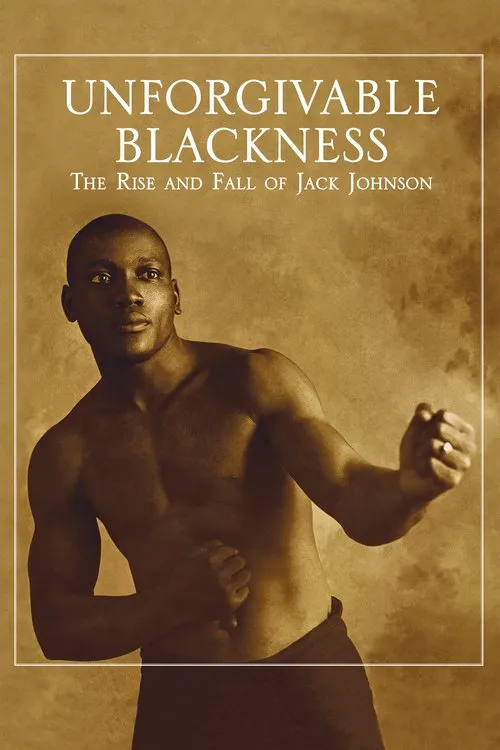Unforgivable Blackness: The Rise and Fall of Jack Johnson

Plot
Born in 1878 to a freed slave mother and an American father of half-black and half-Spanish descent, Jack Lonergan was known professionally as Jack Johnson. Raised in the predominantly African American community of Galveston, Texas, by his mother, he developed a passion for music and boxing. Johnson's athletic prowess led him to begin competing in local boxing matches, eventually gaining recognition within the boxing world. Johnson's career flourished as he rose through the ranks of the sport, eventually securing his first title by defeating Tommy Burns in 1908 for the Black and White World Heavyweight Boxing Championship. However, his success in the ring was met with intense racial backlash. The boxing world, which had grown predominantly white, was threatened by the presence of a black man holding the championship title. Despite the racism Johnson faced, he chose to celebrate his victories by flaunting his wealth and success in public. Johnson's charisma, fashion sense, and lavish lifestyle captured the attention of the media and American society, who viewed him as a symbol of racial rebellion. Through his flamboyant demeanor and behavior, Johnson challenged the racial norms of the time. In 1910, Johnson faced James J. Jeffries, the white heavyweight boxing champion, in a highly publicized match. The 'Great White Hope' was created to describe the expectations surrounding Jeffries, who was seen as a symbol of white redemption in the face of Johnson's success. The match between Johnson and Jeffries drew massive crowds across the United States, with estimates suggesting that over 20,000 people attended the Las Vegas fight. Johnson's victory over Jeffries further fueled racial tensions. Johnson's reign as Heavyweight Boxing Champion lasted eight years, during which time he continued to face racial prejudice and threats to his well-being. He traveled extensively throughout the world, fighting in numerous countries, but the tensions in the United States were beginning to build. The racial tensions surrounding Johnson's success were exacerbated by societal norms and media portrayals of the 'Negro problem.' As a result of Johnson's success, he attracted the attention of the United States government, which viewed him as a threat to racial order. In 1913, Jack Johnson was indicted on charges of transporting an underage girl across state lines for 'immoral purposes,' a crime that carried severe penalties. The prosecution aimed to use this charge to disqualify Johnson from boxing, ultimately leading to his ban from the sport. In 1915, Johnson was arrested, charged, and eventually convicted of the crime, leading to a sentence of one year in prison. Johnson spent six months in a workhouse in Danbury, Connecticut, but was released after serving time for violating his ban from boxing. Following his release from prison, Johnson chose to leave the United States and establish himself in Europe. In an attempt to revive his boxing career, Johnson traveled to Europe and secured several high-profile victories, including a fight against Joe Choynski. The victory solidified Johnson's position as one of the greatest boxers of his time, and, although he continued to face racial tensions, his reputation as a formidable boxer was undeniable. In the 1920s, Johnson's boxing career began to decline, and he eventually retired from the sport. Jack Johnson passed away in 1946, at the age of 68, his legacy marked by controversy, racism, and ultimately, a reevaluation of his place in the history of American sports. 'Unforgivable Blackness: The Rise and Fall of Jack Johnson' portrays Jack Johnson as a complex figure - a talented boxer who defied racial norms, but also a man whose actions fueled tensions and sparked controversy. Through the story of Jack Johnson, the film highlights the complexities of racial tension in America during the early 20th century. Johnson's success as a boxer served as a catalyst for racism, but it also represented a moment of racial rebellion. Johnson's journey from the streets of Galveston to the heavyweight championship of the world offers a nuanced portrayal of the challenges faced by African Americans during the early 20th century, as well as a testament to the power of athletic prowess in transcending societal barriers.
Reviews
Recommendations




